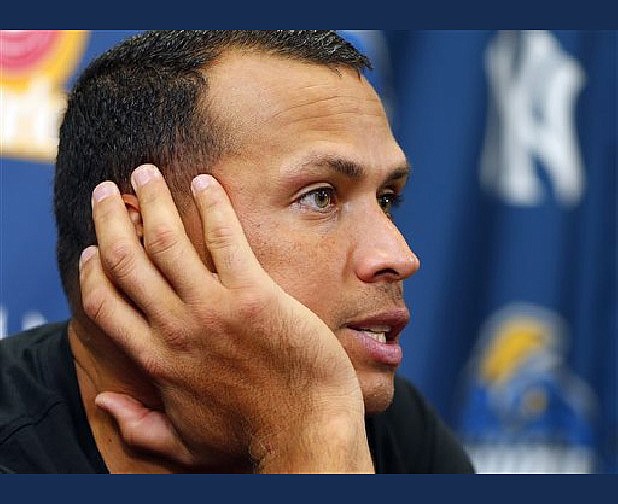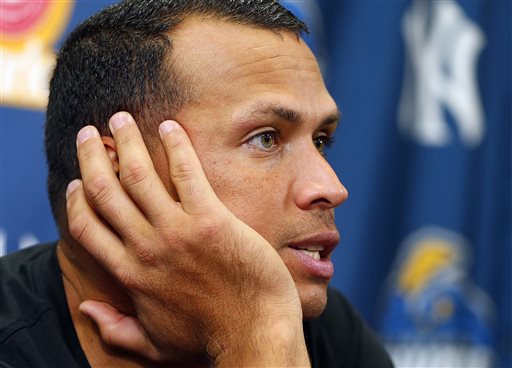Wiedmer: Youth users should be biggest concern about ugliness of PEDs
Wednesday, August 7, 2013
A respected orthopedic surgeon by day, baseball coach to his 7-year-old son Nolan in his spare time, Dr. Matt Bernard is understandably concerned about the threat of performance-enhancing drugs.
“I hope they clean it up, completely get rid of it before Nolan might be tempted to make that choice,” Bernard said Tuesday evening, one day after 13 major leaguers — including New York Yankees third baseman Alex Rodriguez — received significant suspensions due to PEDs.
“But I don’t think making an example of one player (A-Rod) will get steroids out of baseball. The only way to really get rid of PEDs is to test every player three or four times a year, and if you’re caught one time you don’t play anymore.”
It makes sense, even if it might be hard to convince the major league players union to agree to so harsh a penalty. But Bernard also comes to this conclusion from a more experienced perspective than most. The California native once played the sport at a pretty high level, becoming a walk-on pitcher at Alabama in the late 1990s.
“I threw 84-85 miles per hour,” he said. “I knew I was never going to make it to the majors with that kind of stuff. But what if I’d needed just one or two miles an hour more on my fastball to reach the big leagues? I’d like to think I wouldn’t have used steroids, even though I knew guys who did.
“But it’s hard to tell an 18-22-year-old kid not to use them when others are telling him that if you do this one illegal thing, just this one, you might play in the big leagues for five or six seasons. That big-league minimum ($490,000 for 2013) is a lot of money for most of us. I have 10 extra years of school over most people, I make a pretty good living, but I don’t make the major league minimum.”
Taylor Hooton once expected to be that 18-year-old kid. Most every baseball fan remembers his cousin, Burt, who won 151 major league games, mostly with the Chicago Cubs and Los Angeles Dodgers. Taylor wanted a similar career so badly that he began using steroids as a high school junior. Before he could graduate from a Plano, Texas, high school, steroids took such an emotional toll on his mind that he committed suicide.
Said Dr. Babette Farkas, the psychiatrist who was treating young Hooton for depression at the time of his death, when asked if steroids contributed to his suicide: “Yes. No doubt in my mind.”
Ten years later, Taylor’s older brother, Donald — who, like Bernard, played Division I baseball — said of his late brother, “We were walking down the beach one day, our last vacation together, and he said, ‘They make you aggressive and depressed.’ There’s so much focus on steroids at the professional level, but there needs to be much more attention to what’s going on at the high school and middle school level.”
Donald Hooton said recent studies have shown that more than one million teens have admitted to some form of illegal steroid use, the average starting age now 15. And it’s not just boys. Though recent studies have shown as many as 6.5 of every 100 boys may use steroids, 4.5 out of 100 girls have tried them at least once.
“And a University of Minnesota study shows it’s actually on the rise,” Hooton said.
To help slow those numbers, Hooton’s father, Don, started the Taylor Hooton Foundation to educate young people, their parents and coaches about the dangers of steroids. In one of those truth-is-stranger-than-fiction moments, Don Hooton reached out to Rodriguez in 2009 after the soiled slugger first admitted to using PEDs. He wanted A-Rod to help the foundation talk kids out of making the same mistakes he had.
When Major League Baseball suspended Rodriguez through the 2014 season, a span of 211 games pending his appeal, the Hooton Foundation severed ties with the Yankee.
“We have had a good relationship with Rodriguez,” the Foundation said in a statement. “Working together, we’ve delivered messages to thousands of kids and have impacted their lives in a positive way. But today’s announcement leaves us no option but to discontinue our relationship.”
Donald Hooton said the Foundation has educated more than 500,000 youth in the last nine years about the danger of PEDs.
And while the statistics remain unsettling, he said, “It’s all about getting one kid not to use. If we can just slow the usage down, we’ve helped.”
From his Signal Mountain home, Dr. Bernard hopes the Hooton Foundation can make a noticeable difference. But he’s skeptical.
“Look at all the effort we’ve put into educating young people about the dangers of drugs and alcohol,” he said. “We still have big problems with both. I really believe we’ll have those same problems with steroids until our young people see there’s no competitive advantage. If they realize that if you’re caught — and you will be caught — that you’ll no longer be able to play the sport you love, that might stop it on all levels.”
Monday, a new Yankees teammate of A-Rod sounded like he was more than ready for the steroid era to end last week, if not sooner.
One year younger than Rodriguez, 37-year-old Alfonso Soriano said, “We like to compete, but compete clean. That’s part of the game. Compete clean and see what happens. … God gave you the talent, so don’t try to be a superhero or something like that. Just play with the talent God gave you and see what happens.”
It should be that easy. It should be the law, both within professional sports and society in general. Yet despite overwhelming circumstantial evidence from the same Florida lab that brought down A-Rod and 12 other baseball players that athletes from the NFL and NBA — plus college sports — also were using, Major League Baseball has been the only league to act.
Perhaps that’s why when asked Monday why he thought Rodriguez had returned to his PEDs ways, Don Hooton told FoxSports.com, “It says these drugs work.”
Late Tuesday morning, Donald Hooton told of a phone call he received two years ago.
“The guy said he needed to tell me about a friend of his,” Hooton said. “He said he’d seen his friend inject his 7-year-son with anabolic steroids, hoping to make him a better athlete. I told him, ‘You don’t need to call me. You need to call Child Protective Services.’”
Said Bernard: “That’s the ultimate horror story.”
That’s also why the face of the PEDs crisis needs to be a lost life such as Taylor Hooton rather than a wasted one such as A-Rod.
Contact Mark Wiedmer at mwiedmer@timesfreepress.com

